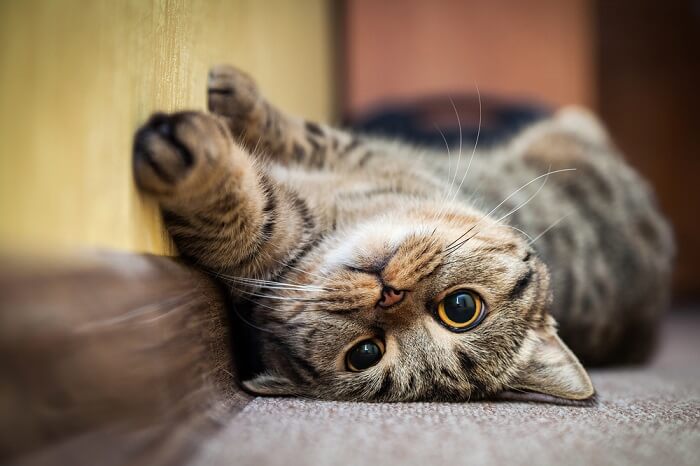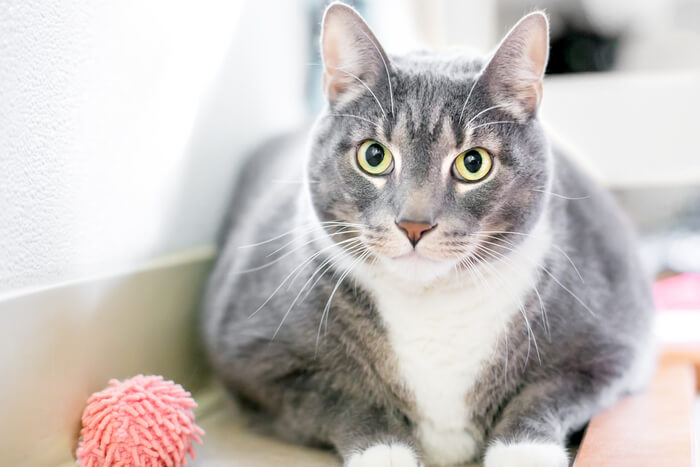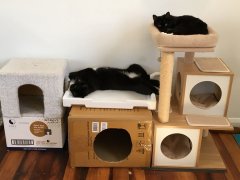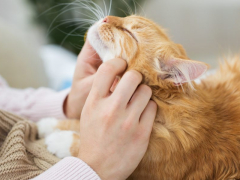
Autism spectrum disorder (ASD) is a developmental condition in humans that causes challenges in speech, nonverbal communication, social interaction, and restricted and/or repetitive behaviors.
Based on feline behavior and the book ‘All Cats are on the Autism Spectrum‘ by Kathy Hoopman, some people may believe that cats have autistic tendencies. But are cats autistic, or are we anthropomorphizing?
Can Cats Have Autism?
While cats can have some behavioral quirks that mimic some signs of autism in humans, there is no evidence that cats have autism. As humans, we love our cats and deeply enjoy the relationship we have with these creatures, and we often give human meanings to their behaviors as a result (that’s called anthropomorphizing).
This can lead to confusion and misinterpretation of feline behavior, including misinterpreting normal feline behavior for behaviors associated with autism in humans. Cats don’t see or think about the world the same way we do. Let’s look at this in more detail.
How Feline Behavior May Resemble Autism

Normal feline behavior may resemble symptoms of autism in cats.
1. Anti-social behavior: One common trait seen in autistic people is a tendency to be anti-social. This usually has less to do with a desire to be alone and more to do with an inability to understand human social cues and engage with typical social interactions.
Cats also like to be alone, but that isn’t because they don’t understand our social behavior and cues, sometimes they just prefer their own company. In the wild, cats tend to be solitary hunters, so it would make sense that they would bring the instinct to be a loner with them into the home.
Also Read: How To Socialize a Kitten: 6 Vet-Approved Steps
Not all cats like to be alone, some cats are extroverts and prefer to be social and snuggle. Other cats like to be alone – we hold space for them all.
2. Vocalization: One reason why cat owners think their cat might be autistic is excessive vocalization. Some human beings with ASD may only direct their vocalization toward one person: the same happens in some cats who only meow, purr, or chirp when they are near certain people.
This is not autism, this is catism (see what I did there?), and is usually perfectly normal in cats. Cats may only vocalize around the person they are bonded to, or the person who feeds them. In fact, some cats have trained their humans very well and know that when they yowl at their person, that person will feed them.
Some cats, like Siamese or Oriental Shorthairs, have a breed specific tendency to be vocal.
If your previously not-vocal or moderately-vocal kitty suddenly becomes vocal, however, that is a sign that something is wrong. One of the signs of hyperthyroidism, a common hormonal condition in older cats, is excessive vocalization.
If your cat starts talking a lot out of nowhere, schedule a veterinary check up to make sure something else isn’t going on.
3. Fascination with Lights and Movement: Anybody who has used a laser pointer to play with a cat knows that cats are fascinated with lights and movement. This has nothing to do with autism and everything to do with a cat’s predatory instinct to chase whatever is moving.
In the wild, cats have to hunt for their food, therefore they have a strong predator instinct to chase anything that moves. Bring that instinct into the home, throw in some laser pointers, and you have a great way to exercise your cat.
Also Read: Are Cats Obligate Carnivores?
Just make sure to land the light on a treat or toy so the cat can actually ‘catch’ his prey on a regular basis to prevent development of shadow and light chasing.
4. Sensory Abnormalities: Humans with ASD often present with sensory abnormalities. Cats can also demonstrate decreased responsiveness or be excessively clumsy, but this is not autism. When it happens in cats it is indicative of another underlying problem that is negatively impacting the health of the cat.
Advanced kidney disease, diabetes, liver disease, toxins, cerebellar hypoplasia, and brain tumors can all cause sensory abnormalities, and lack of focus in cats. If you notice that any sensory or coordination problems in your cat, call your vet immediately.
5. Strong Preferences: Children with ASD often demonstrate strong preferences for one particular toy or food. Cats are also known to obsess over one toy, and they are notorious for strong food preferences, even preferring one particular shape of kibble over another, i.e. will eat star-shaped kibble but won’t eat triangular kibble. If they have been conditioned to eat star-shaped kibble, it can be difficult to convince them that triangle kibble is also food.
If they have eaten dry food their whole life, then a bowl full of canned food can be very confusing to them. You can prevent strong food preferences by feeding a combination of dry and canned food to cats from a young age. When it comes to toy preferences – just let them have what they want to have.
So Is My Cat Autistic?

Autism is a complex syndrome affecting humans. Feline behavioral quirks may mimic the symptoms of autism in humans, but there is no evidence that cats can have autism.
Hopefully, this article has reassured you your cat and cats in general don’t have autism, at least they don’t have the human form of autism, and most of the behaviors seen in cats that look like autistic behaviors are actually normal feline behaviors.
If, however, your previously normal cat suddenly develops abnormal behaviors or is hiding more, acting sick in any way, or if you are concerned in any way about your cat’s behavior or psychological state, don’t hesitate to call your local veterinarian and ask for advice.
Frequently Asked Questions
Can cats have special needs?
Yes, cats most definitely can have special needs! Any cat that has a disability, whether it be a missing limb, mental or neurological disabilities, or other disease, cats can and do have special needs which require extra care.
Can animals be autistic?
As far as we know, non-human animals do not have autism. Animals can have mental or other physical disabilities that can have symptoms that mimic the signs of autism in humans, however the underlying cause is usually another diagnosable disease.
Can cats have mental illness?
Cats can have psychological and mental disabilities. Conditions like fear aggression, anxiety, feline stress cystitis, seizure disorders, and compulsive disorders are all seen in cats.
Can cats have sensory issues?
Humans with ASD often present with sensory abnormalities. Cats can also demonstrate decreased responsiveness or be excessively clumsy, but these are affiliated with ASD. When this occurs in cats it is indicative of another underlying problem that is negatively impacting the health of the cat. Advanced kidney disease, diabetes, liver disease, toxins, cerebellar hypoplasia, and brain tumors can all cause sensory abnormalities, and lack of focus in cats. If you notice that any sensory or coordination problems in your cat, call your vet immediately.








This article once again reinforces some neurotypical bullshit because they know that if autism is a natural state then corporations, politicians, and so forth would have to start treating neurotypical and neurodivergent people as human beings instead of tools for cheap labor. The author of this article is likely a victim or part of the problem. Hopefully, it’s the former.
Hi, Tim. It’s certainly not our intention to spread stereotypes. While this piece was written with the goal of being a lighthearted comparison/contrast of cat vs human traits, I agree that it’s worth taking a closer look at some of the language and perhaps reconsidering the subject entirely. I’ll put a word in with our editorial team. Thanks for your feedback!
Hi, I just wanted to mention that it’s untrue that biologically male children are “more likely to have autism,” rather, “more likely to get diagnosed.” I don’t really have the time to link anything right now, but I suggest you do more research and find autistic-written articles about the gender bias with diagnosis, especially in the United States. Thanks!
Thanks for the insight and perspective. We’ll re-evaluate the claims in the article.
Thank you for the correction.
I didn’t mean that you cannot find useful and trustworthy information on the internet, I should have written, never trust the internet blindly. Veterinarians are also human and can be wrong. Never trust anyone.. I’m kidding.
By the way, I think all cats are “autistic” and of course they cannot be autistic.
I would add that autistic people often have sensory sensibilities and cats have quite an enhanced perception, so they too get easily disturbed by loud noises or strong smells.
Martaflora
Of course. I would agree with your assessment. Thank you for taking the time to reply. 🙂
“Cats have a poor sense of smell, and rely on other senses, including vision and touch, to identify their food.”
Cats have a poor sense of smell? Thanks god they can put on their reading glasses to be able to decide whether that’s food in front of them.
Never trust the internet, not even when the info is seemingly coming from a professional.
I’m sorry, that comment slipped through during the editing process. I’ve deleted the incorrect claim and completely agree that this should never have made it into the article. My only suggestion is that you reconsider your view of “the internet” and its trustworthiness, given that the same inaccurate statement could be made by a veterinarian in person just as well. And offline, you’d have no way of telling everyone interested in the same subject that it was wrong. In that sense, perhaps the internet is a better place to get trustworthy information. – Mallory
“This usually has less to do with a desire to be alone and more to do with an inability to understand human social cues and engage with typical social interactions.
Cats also like to be alone, but that isn’t because they don’t understand our social behavior and cues, sometimes they just prefer their own company.”
Actually, a lot of autistic people also have less intrinsic social motivation than neurotypical people, meaning that often an autistic person will be alone not because they want to engage and can’t, but because they prefer their own company, just like cats.
And I’d argue that rather than saying cats can’t be autistic, it’s more accurate to say that for cats, autistic is the norm rather than an abnormality. A lot of animals have characteristics that would be considered disabilities in humans, but are normal for their species.
Good perspective, Ettina. Thanks for sharing.